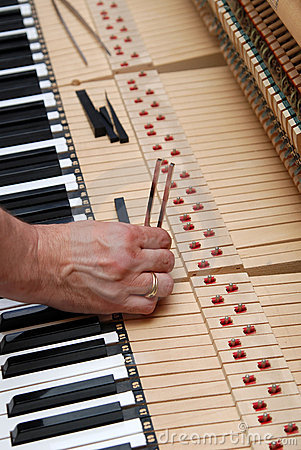Today, I tuned a piano at a mansion. Before I got to the door, I looked up the appoinment, and there was a note that said “Recommended new strings and pins, pins loose.”
Now, maybe because I am having a cash flow problem right now (Single income, homeschooling four kids), I felt a little arrogant and thought to myself “If these people are not going to take care of this instrument when they (appear to) have so much money, I am just going to drop them as customers because, one, they don’t care about their piano, or two, they don’t trust me.”
As I was tuning this piano, I started having different feelings. I was starting to feel sad for this piano, because if these people don’t rebuild the piano, it will probably end up in the dump. I spoke to the owner about the future of her piano and she seemed uninterested. “Oh well, my kids will probably take it after we’re gone. They’ll probably just junk it and get a new one.”
How are we, as a society of piano technicians, supposed to educate people? How are we to get the word out that $10,000 to rebuild this awesome instrument, will result in a better instrument than a new Yamaha U1 at less cost? And in 50 years, this instrument will still be around and the Yamaha will be toast. Of course, these are just my opinions and we won’t really know for sure until 50 years have passed. But from the current condition of 50 year old Yamahas, compared with some 100 year old uprights, that is where I make my judgement.
Also, wealthy people will think nothing of buying a luxurious sports cars at $50,000+, only to have it rust away in 15 years and be worth little, whereas, a rebuilt piano will hold its value for years to come, and also produce beautiful music, add beauty to a room, and exist as a work of art in its own right. These same people will hem and haw and try to squeeze piano rebuilders to get the lowest price possible from a piano technician who may not be a savvy businessperson. This kind of predatory activity is what pushes technicians out of the rebuilding business. I’ve seen too many shops go bankrupt.
There are so many reasons to rebuild old pianos, someday I will write an article describing them all. But the main reason is that, a part of our history is being bull-dozed off tractor trailers into city dumps as we speak. A rebuilding friend of mine burnt FORTY pianos this summer at his cottage in the country because they were taking up too much space in his workshop! This is musical genocide and very few people are taking notice. I know this is not a world issue relating to poverty or economics (there may be a connection here) but it still makes me very sad to think that the only things left to remind us of a different time, a time when people joined together in song around the piano, a time when the whole of society recognized the value of consistent effort and had all their kids take piano lessons, a simpler time when pianists transposed in realtime by ear instead of by a button, are disappearing forever. To look at an old piano and imagine its better days is like looking at our own future. Where are these pianos going? Where are we going? Shouldn’t somebody care?
So, if you have an old piano. Do me a favour and get a qualified technician to look at it and give you a realistic opinion of its potential. Then if you can afford it, and it has potential, have it rebuilt properly. You will end up with an exceptional musical instrument that will not be thrown out. It will not be thrown out because it will have value. At least for another 100 years anyway.




